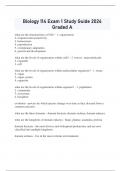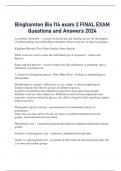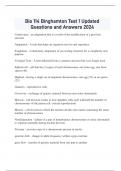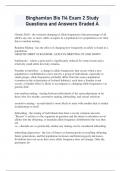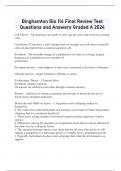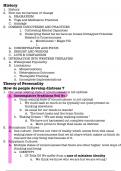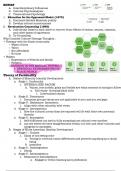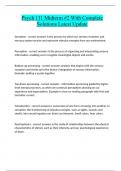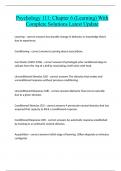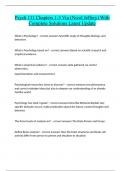State University Of New York - Binghamton
Latest uploads at State University Of New York - Binghamton. Looking for notes at State University Of New York - Binghamton? We have lots of notes, study guides and study notes available for your school.
-
372
- 0
-
15
All courses for State University Of New York - Binghamton
Popular books State University Of New York - Binghamton
Latest notes & summaries State University Of New York - Binghamton
what are the characteristics of life? - 1. organization 2. responsiveness/sensitivity 3. homeostasis 4. reproduction 5. evolutionary adaptation 6. growth and development what are the levels of organization within cells? - 2. lowest : macromolecule 2. organelle 3. cell what are the levels of organization within multicellular organisms? - 1. tissue 2. organ 3. organ system 4. organism what are the levels of organization within orgaisms? - 1. population 2. community 3. ecosyst...
Taxonomic hierarchy - a system of classifying and naming species for the purpose of understanding and establishing relatedness between species or larger groupings Kingdom Phylum Class Order Family Genus Species What words are used to name the individual type of organism? - Genus and Species Super and Sub prefixes - used to further describe refinement of groupings above and below a certain level 3 criteria for designating species: Boys Make Pasta - biological, morphological, phylogen...
Contrivance - an adaptation that is a result of the modification of a previous ancestor Adaptation - A trait that helps an organism survive and reproduce Exaptation - evolutionary adaptation of an existing structure for a completely new purpose Vestigial Trait - A trait inherited from a common ancestor but is no longer used dipliod cell - cell that has 2 copies of each chromosome, one from egg, one from sperm (46) Hapliod - having a single set of unpaired chromosomes, one egg (23)...
Genetic Drift - the constant changing of allele frequencies (that percentage of all alleles any one, or more, allele occupies in a population) in a population over time, due to random mating. Random Mating - has the effect of changing how frequently an allele is found in a population. GENETIC DRIFT IS RANDOM, ALWAYS DRIFTING UP AND DOWN bottlenecks - where a gene pool is significantly reduced for some reason and a relatively small allele diversity remains. Founder event/effect - a cha...
Cell Theory - All organisms are made of cells, and all cells come from pre-existing cells. Conclusion: If you trace a cell's lineage back far enough, you will discover that all cells are descended from a common ancestral cell Evolution - The heritable change in a population over time or a change in gene frequency in a population over a number of generations Proximate process - what happens in short term, measured in fractions of lifetimes Ultimate process - longer timeframe (lifeti...
In class notes full lecture content covered
Mindfulness and Multicultural Theories Notes
Sensation - correct answers is the process by which our sensory receptors and nervous system receive and represent stimulus energies from our environment. Perception - correct answers is the process of organizing and interpreting sensory information, enabling us to recognize meaningful objects and events. Bottom-up processing - correct answers analysis that begins with the sensory receptors and works up to the brains's integration of sensory information. Example: putting a puzzle together...
Learning - correct answers Any durable change in behavior or knowledge that is due to experience. Conditioning - correct answers Learning about associations. Ivan Pavlov () - correct answers Psychologist who conditioned dogs to salivate from the ring of a bell by associating a bell noise with food. Unconditioned Stimulus (US) - correct answers The stimulus that evokes and unconditioned response without previous conditioning. Unconditioned Response (UR) - correct answers Behavior that...
What is Psychology? - correct answers Scientific study of thoughts,feelings, and behaviors What is Psychology based on? - correct answers Based on scienIfic research and empirical evidence What is empirical evidence? - correct answers data gathered via careful observaIon, experimentaIon,and measurement Psychological researches strive to discover? - correct answers new phenomena and correct mistaken ideas,but also to deepen our understanding of an already familiar world Psychology h...


